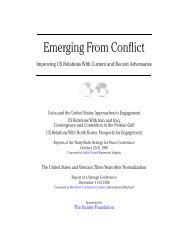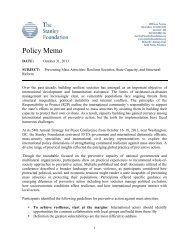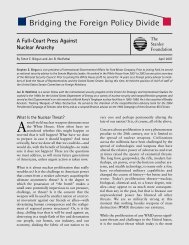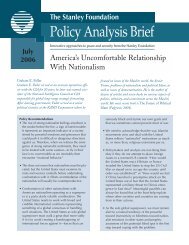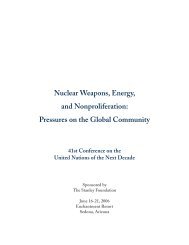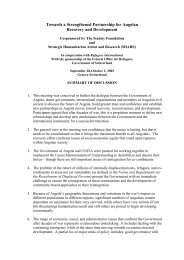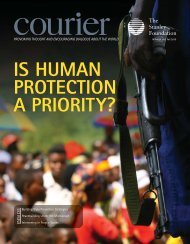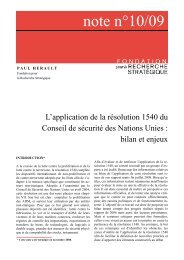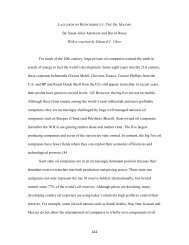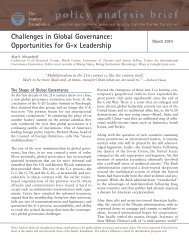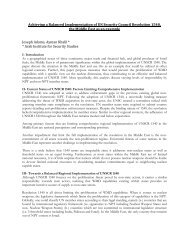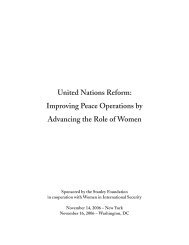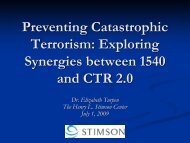Download the PDF (608K) - The Stanley Foundation
Download the PDF (608K) - The Stanley Foundation
Download the PDF (608K) - The Stanley Foundation
Create successful ePaper yourself
Turn your PDF publications into a flip-book with our unique Google optimized e-Paper software.
<strong>The</strong> Role of <strong>the</strong><br />
United Nations<br />
in Eliminating Weapons<br />
of Mass Destruction<br />
Report of <strong>the</strong> Twenty-Seventh<br />
United Nations<br />
Issues Conference<br />
Sponsored by<br />
<strong>The</strong> <strong>Stanley</strong> <strong>Foundation</strong><br />
February 23-25, 1996<br />
Convened at Arden House, Harriman, New York<br />
Executive Summary<br />
While <strong>the</strong> end of <strong>the</strong> Cold War greatly reduced some global threats<br />
to security, enduring ethnic rivalries and regional tensions have<br />
created pressures on nations to continue to develop or expand <strong>the</strong>ir<br />
arsenals of weapons of mass destruction. At <strong>the</strong> same time, global<br />
political conditions are ripe for real progress in eliminating <strong>the</strong>se<br />
weapons. Traditionally, <strong>the</strong> United Nations has been engaged in<br />
arms control and disarmament through developing norms, negotiating<br />
treaties, and monitoring compliance. However, in light of<br />
today’s new challenges, it is time to ask whe<strong>the</strong>r <strong>the</strong> international<br />
community is taking full advantage of <strong>the</strong> United Nations.<br />
Participants reviewed <strong>the</strong> preconditions for <strong>the</strong> total elimination of<br />
weapons of mass destruction, evaluated <strong>the</strong> current obstacles to<br />
disarmament, discussed <strong>the</strong> elements of an effective disarmament<br />
regime, and suggested strategies and tactics to this end.
Preconditions: Security and a Global Commitment<br />
Participants agreed that a unique window of opportunity exists<br />
springing from events occurring in <strong>the</strong> last few years: <strong>the</strong> Conventional<br />
Forces in Europe Treaty and START I have entered into<br />
force, START II was ratified by <strong>the</strong> United States and is awaiting<br />
action by <strong>the</strong> Russian Duma, <strong>the</strong> Nuclear Non-Proliferation Treaty<br />
was extended indefinitely, some nations have renounced altoge<strong>the</strong>r<br />
<strong>the</strong>ir nuclear weapons programs, and <strong>the</strong> Chemical Weapons<br />
Convention is on <strong>the</strong> road to ratification. <strong>The</strong> international community<br />
can build on this momentum to achieve even greater<br />
reductions in <strong>the</strong> development and use of weapons of mass<br />
destruction.<br />
Participants agreed, however, that real progress may be achieved<br />
only after nations have reached an affirmative commitment, or<br />
“compact,” to <strong>the</strong> total elimination of weapons of mass destruction.<br />
This would require nations to move beyond <strong>the</strong>ir sense of<br />
insecurity—a difficult task in that armament feeds insecurity and<br />
is fueled by insecurity. Ultimately, a sense of security will be<br />
dependent on trust. Reaching a global compact and carrying out<br />
nations’ commitments would be a very slow process that would<br />
involve repeated substantial security assurances and require greatly<br />
reduced levels of conventional arms.<br />
Obstacles<br />
Participants identified obstacles to <strong>the</strong> elimination of weapons of<br />
mass destruction. <strong>The</strong> import and export of dual-use<br />
materials—materials having civil and military uses—was seen as a<br />
significant impediment. Opinions differed on <strong>the</strong> solution: while<br />
some advocated more controls at <strong>the</strong> national and international<br />
levels, o<strong>the</strong>rs argued for a more flexible system where nations<br />
examine case by case <strong>the</strong> intent of importing nations. Technological<br />
advances and <strong>the</strong> easy spread of knowledge hinder weapons control<br />
as well, particularly with respect to chemical and biological<br />
weapons. Nuclear smuggling also threatens <strong>the</strong> international community,<br />
but <strong>the</strong> first line of control would be within nations. International<br />
efforts should focus on more accurate record keeping,<br />
greater transparency in trade, and data-sharing among international<br />
organizations. <strong>The</strong> most difficult obstacles to eliminating<br />
weapons of mass destruction are <strong>the</strong> regional tensions within East<br />
2
Asia, South Asia, and <strong>the</strong> Middle East and inconsistent enforcement<br />
of treaty obligations by <strong>the</strong> Security Council.<br />
Elements of an Effective Disarmament Regime<br />
An effective disarmament regime would require setting international<br />
norms, treaty negotiation, enforcement, verification and<br />
monitoring, confidence-building measures, transparency, and fostering<br />
regional steps to disarmament. <strong>The</strong> United Nations’ performance<br />
in <strong>the</strong>se areas is not consistent. While <strong>the</strong> United Nations is<br />
successful in norm-building and fostering treaty negotiation, its<br />
Security Council-dominated enforcement system was characterized<br />
by most participants as unreliable and overly politicized.<br />
Some participants supported <strong>the</strong> current system, arguing that alternative<br />
enforcement arrangements are politically unrealistic. <strong>The</strong>re<br />
was also disagreement on <strong>the</strong> United Nations’ record on verification,<br />
with some arguing for a stronger system and o<strong>the</strong>rs cautioning<br />
against interference with nations’ sovereign rights. Participants<br />
generally agreed with <strong>the</strong> need to expand transparency and confidence-building<br />
measures and endorsed <strong>the</strong> growth of regional<br />
nuclear-weapons-free zones.<br />
Strategies and Tactics<br />
Most participants envisioned a greater role for <strong>the</strong> United Nations<br />
in a streng<strong>the</strong>ned disarmament regime, but only after certain<br />
reforms. <strong>The</strong> Secretariat lacks a professional staff of arms control<br />
experts and <strong>the</strong> Disarmament Commission could be used to<br />
explore issues not addressed by <strong>the</strong> General Assembly or <strong>the</strong> Security<br />
Council. Most participants believed <strong>the</strong> Security Council’s veto<br />
power most weakened treaty enforcement to <strong>the</strong> extent its use has<br />
resulted in inconsistent responses to noncompliance. Participants<br />
discussed <strong>the</strong> following reforms of <strong>the</strong> Security Council:<br />
• Prohibit <strong>the</strong> use of <strong>the</strong> veto in cases of treaty noncompliance.<br />
• Limit application of <strong>the</strong> veto to nonmilitary enforcement decisions.<br />
• Amend <strong>the</strong> Non-Proliferation Treaty and <strong>the</strong> chemical and biological<br />
weapons conventions to clarify <strong>the</strong> Security Council’s<br />
responsibilities.<br />
• Remove <strong>the</strong> Security Council’s enforcement powers and vest<br />
<strong>the</strong>m in <strong>the</strong> separate treaty regimes<br />
• Assign some or all Security Council enforcement authority to<br />
3
ei<strong>the</strong>r a new or a transformed UN body.<br />
• Expand membership to enhance regional representation.<br />
• Create a special Security Council rapporteur for disarmament<br />
or a permanent staff of disarmament experts serving <strong>the</strong> Security<br />
Council.<br />
Participants explored <strong>the</strong> merits of o<strong>the</strong>r avenues to <strong>the</strong> total elimination<br />
of weapons of mass destruction. Consolidating <strong>the</strong> nuclear,<br />
chemical, and biological weapons treaty regimes once <strong>the</strong>y are<br />
fully operational, encouraging greater involvement by nongovernmental<br />
organizations in <strong>the</strong> UN disarmament process, and increasing<br />
<strong>the</strong> number of regional nuclear-weapons-free zones were<br />
among <strong>the</strong> issues debated.<br />
4
Participants<br />
Chair<br />
Richard H. <strong>Stanley</strong>, President, <strong>The</strong> <strong>Stanley</strong> <strong>Foundation</strong><br />
Rapporteurs<br />
Bruno Pigott, Program Officer, <strong>The</strong> <strong>Stanley</strong> <strong>Foundation</strong><br />
Mary <strong>The</strong>isen, Program Officer, <strong>The</strong> <strong>Stanley</strong> <strong>Foundation</strong><br />
Participants<br />
Berhanykun Andemicael, Representative of <strong>the</strong> Director-General,<br />
International Atomic Energy Agency<br />
Richard Butler, Permanent Representative of Australia to <strong>the</strong> United<br />
Nations<br />
John Despres, US Assistant Secretary of Commerce for Export<br />
Enforcement<br />
Rolf Ekéus, Executive Chairman, United Nations Special Commission<br />
on Iraq<br />
Nabil Elaraby, Permanent Representative of <strong>the</strong> Arab Republic of<br />
Egypt to <strong>the</strong> United Nations<br />
Ahmad Kamal, Permanent Representative of Pakistan to <strong>the</strong> United<br />
Nations<br />
Sohrab Kheradi, Deputy Director, Centre for Disarmament Affairs,<br />
Department of Political Affairs, United Nations<br />
James Leonard, Acting President, United Nations Association of<br />
<strong>the</strong> United States of America<br />
Edward C. Luck, President Emeritus and Senior Policy Adviser,<br />
United Nations Association of <strong>the</strong> United States of America<br />
Michael L. Moodie, President, Chemical and Biological Arms Control<br />
Institute<br />
5
Qin Huasun, Permanent Representative of <strong>the</strong> People’s Republic<br />
of China to <strong>the</strong> United Nations<br />
Ben Sanders, Executive Chairman, Programme for Promoting<br />
Nuclear Non-proliferation<br />
Edwin M. Smith, Leon Benwell Professor of Law and International<br />
Relations, University of Sou<strong>the</strong>rn California<br />
Roland Timerbaev, President, Center for Policy Studies in Russia<br />
<strong>Stanley</strong> <strong>Foundation</strong> Staff<br />
Susan Moore, Conference Management Associate<br />
Keith Porter, Producer, Common Ground<br />
Affiliations are listed for identification purposes only. Participants attended as individuals<br />
ra<strong>the</strong>r than as representatives of <strong>the</strong>ir governments or organizations.<br />
6
Opening Remarks<br />
by Richard H. <strong>Stanley</strong>, President, <strong>The</strong><br />
<strong>Stanley</strong> <strong>Foundation</strong><br />
Welcome to <strong>the</strong> twenty-seventh United<br />
Nations Issues Conference. Our topic,<br />
“<strong>The</strong> Role of <strong>the</strong> United Nations in Eliminating<br />
Weapons of Mass Destruction” is<br />
both timely and challenging. Although<br />
<strong>the</strong> Cold War is over and superpower<br />
tensions have diminished greatly, <strong>the</strong><br />
threat posed by weapons of mass<br />
destruction has not disappeared. In fact,<br />
<strong>the</strong> enduring presence of nuclear, chemical,<br />
and biological weapons continues to threaten global security.<br />
As long as such weapons exist, a secure peace with freedom and<br />
justice will be at risk.<br />
Why is now a good time to talk seriously about eliminating<br />
weapons of mass destruction? Let me suggest several reasons.<br />
First, while <strong>the</strong> end of superpower rivalry minimized some global<br />
security threats, many remain. A mushrooming of ethnic rivalries<br />
and enduring regional tensions have created pressures on nations<br />
to expand or develop <strong>the</strong>se massively destructive weapons. In <strong>the</strong><br />
Middle East, <strong>the</strong> world had a wake-up call when Iraq’s possession<br />
of chemical and biological weapons stockpiles and nascent nuclear<br />
capabilities were fully discovered. In East Asia, North Korea’s defiance<br />
of established nonproliferation norms threatened <strong>the</strong> viability<br />
of <strong>the</strong> Non-Proliferation Treaty. While <strong>the</strong>se crises have been averted,<br />
<strong>the</strong>re is no guarantee that <strong>the</strong> international community will<br />
effectively deal with similar events in <strong>the</strong> future.<br />
Globally, nuclear weapons problems persist. Testing continues.<br />
Smuggling of nuclear materials by terrorists presents grave security<br />
risks. And, while vertical disarmament should be promising in<br />
this post-Cold War era, <strong>the</strong> pace is disturbingly slow. We are<br />
alarmed by reports of development of chemical weapons in various<br />
countries, and of <strong>the</strong>ir use—even against domestic populations.<br />
Growing stockpiles of unsafe and inadequately protected<br />
7
chemical weapons not only present security threats but environmental<br />
and health hazards as well. <strong>The</strong> list goes on, and I am sure<br />
it will be more than adequately discussed in <strong>the</strong> days ahead. <strong>The</strong><br />
point is that all of <strong>the</strong>se problems and developments clearly<br />
demonstrate <strong>the</strong> need to stop <strong>the</strong> spread of weapons of mass<br />
destruction and to work seriously toward <strong>the</strong>ir elimination.<br />
Second, opportunities exist to push for complete disarmament, but<br />
we will not be able to build momentum unless we take advantage<br />
of <strong>the</strong>m. We have made progress. Last year <strong>the</strong> five nuclear<br />
weapons states pledged to complete negotiations on a Comprehensive<br />
Nuclear Test Ban Treaty by September 1996. START II was ratified<br />
last month by <strong>the</strong> US Senate in a near-unanimous vote. <strong>The</strong><br />
Russian Duma may take action on <strong>the</strong> treaty this summer. Successful<br />
completion of both <strong>the</strong> test ban and START II would provide a<br />
tremendous boost to nuclear arms control and could lead <strong>the</strong> way<br />
to nuclear disarmament. <strong>The</strong> Chemical Weapons Convention, completed<br />
in 1993, continues to gain international support. Although<br />
forty-two states have ratified <strong>the</strong> convention, sixty-five are needed<br />
before it may enter into force. It is encouraging, however, that onehundred<br />
fifty-nine countries have now signed <strong>the</strong> convention. With<br />
respect to biological weapons, negotiations are well underway to<br />
create a legally binding instrument that will provide <strong>the</strong> means of<br />
verification that was previously lacking in <strong>the</strong> biological weapons<br />
control regime. A special United Nations’ committee is working to<br />
incorporate fur<strong>the</strong>r confidence-building and transparency measures<br />
into <strong>the</strong> biological weapons regime and is crafting a program<br />
for international cooperation in biotechnology for peaceful purposes.<br />
<strong>The</strong> next biological weapons convention review conference will<br />
be held late this year.<br />
Finally, and perhaps most important, changes in <strong>the</strong> global political<br />
environment should permit real advances in <strong>the</strong> elimination of<br />
weapons of mass destruction. Today security is no longer defined<br />
solely by military strength; ra<strong>the</strong>r, it includes several dimensions,<br />
including political stability, a healthy economy and environment,<br />
and respect for human rights. <strong>The</strong>re is a growing realization<br />
among experts and observers that nei<strong>the</strong>r status in <strong>the</strong> global community<br />
nor solutions to complex problems can be found through<br />
nuclear, chemical, or biological weapons. Ethnic conflicts such as<br />
<strong>the</strong> world has seen in Bosnia, devastating humanitarian disasters,<br />
8
intractable civil wars, and far-reaching economic crises call for<br />
more innovative solutions. In this environment, weapons of mass<br />
destruction—indeed, even <strong>the</strong> use of force—have been rendered<br />
far less relevant. Consistent with this new outlook, various states<br />
have renounced <strong>the</strong> use and production of nuclear weapons—most<br />
notably, Ukraine, South Africa, Japan, and Germany. <strong>The</strong>ir renunciation<br />
has bolstered world security. Moreover, growing economic<br />
interdependence and technological change, particularly in communications,<br />
have altered traditional notions of sovereignty and have<br />
ushered in an era where countries increasingly share common<br />
interests and objectives. As Barry Blechman and Cathleen Fisher<br />
have so aptly stated in a recent Foreign Policy article, “[t]he use of<br />
force, once accepted as an unfortunate but necessary consequence<br />
of a world in which states remain sovereign, is losing its legitimacy<br />
except as a multinational instrument to enforce common values.”<br />
Perhaps for <strong>the</strong> first time since <strong>the</strong> Second World War, a window of<br />
opportunity exists to eliminate, once and for all, weapons of mass<br />
destruction.<br />
Why should we think about <strong>the</strong> United Nations’ role in disarmament?<br />
What should its contribution be at this critical juncture? <strong>The</strong><br />
United Nations has served a significant role in developing <strong>the</strong><br />
world’s weapons control regime and is in <strong>the</strong> best position to forge<br />
<strong>the</strong> remaining work that needs to be done. <strong>The</strong> Non-Proliferation<br />
Treaty as well as <strong>the</strong> chemical and biological weapons conventions<br />
were negotiated under UN auspices. <strong>The</strong> Comprehensive Test Ban<br />
Treaty is nearing completion in <strong>the</strong> Disarmament Commission.<br />
Last June, <strong>the</strong> Non-Proliferation Treaty was indefinitely extended<br />
by <strong>the</strong> General Assembly—a political breakthrough that seemed<br />
elusive only one year before. In <strong>the</strong> wake of <strong>the</strong> gulf war, <strong>the</strong> Security<br />
Council established a special commission on Iraq to render<br />
harmless Iraq’s biological, chemical, and nuclear weapons—<strong>the</strong><br />
first time <strong>the</strong> United Nations has involved itself in <strong>the</strong> dismantling<br />
of a nation’s entire weapons system.<br />
<strong>The</strong> United Nations is <strong>the</strong> only institution capable of serving <strong>the</strong><br />
needs and interests of a broad range of countries each having multifaceted<br />
disarmament goals. For nonnuclear member states, <strong>the</strong><br />
United Nations provides an opportunity for individual and regional<br />
concerns to be brought before <strong>the</strong> world community. For nuclear<br />
states, <strong>the</strong> United Nations has provided a forum for addressing <strong>the</strong><br />
9
need to halt weapons proliferation while at <strong>the</strong> same time serving<br />
to impose on <strong>the</strong>m certain international responsibilities, including<br />
progress toward disarmament. I think my own country needs to be<br />
reminded of <strong>the</strong> important role <strong>the</strong> United Nations has had in taking<br />
actions that are consistent with serving US security interests.<br />
For example, <strong>the</strong> work of various groups—such as <strong>the</strong> International<br />
Atomic Energy Agency in nuclear nonproliferation, <strong>the</strong> Special<br />
Commission in neutralizing Iraq’s weapons program, and <strong>the</strong> Disarmament<br />
Commission in negotiating <strong>the</strong> Comprehensive Test Ban<br />
Treaty—has served US security goals as well as those of o<strong>the</strong>r<br />
nations. Clearly, for <strong>the</strong> United States and <strong>the</strong> rest of <strong>the</strong> world, <strong>the</strong><br />
United Nations is <strong>the</strong> only place where all nations can work toge<strong>the</strong>r<br />
on disarmament.<br />
Like it or not, <strong>the</strong> United Nations is <strong>the</strong> only game in town. It is <strong>the</strong><br />
only organization available to deal with <strong>the</strong>se issues. For instance,<br />
in this post-Cold War era where <strong>the</strong> influence of superpowers has<br />
greatly diminished, multilateral action to prevent <strong>the</strong> spread of<br />
nuclear, chemical, and biological weapons is essential. <strong>The</strong> United<br />
Nations is <strong>the</strong> only place to deal with both vertical and horizontal<br />
proliferation. And <strong>the</strong> United Nations is <strong>the</strong> only international<br />
body that can perform <strong>the</strong> range of tasks necessary to reign in<br />
weapons proliferation, from <strong>the</strong> creation of norms and standards to<br />
<strong>the</strong> enforcement of international commitments.<br />
But if everything were perfect, we would not be here. While <strong>the</strong><br />
challenges before <strong>the</strong> United Nations are many, <strong>the</strong> organization’s<br />
capacity to deal with <strong>the</strong>m is very limited. Currently, <strong>the</strong> United<br />
Nations and national governments move from crisis to crisis,<br />
developing ad hoc measures along <strong>the</strong> way. Member states’ financial<br />
support of <strong>the</strong> United Nations is unpredictable. <strong>The</strong> United<br />
Nations and its related organizations have weak enforcement<br />
mechanisms, and <strong>the</strong>ir intelligence and monitoring activities rely<br />
on member states’ good will. Solutions to <strong>the</strong>se and o<strong>the</strong>r problems<br />
must necessarily accompany any revitalized role of <strong>the</strong> United<br />
Nations in eliminating weapons of mass destruction.<br />
Now is <strong>the</strong> time for member states to streng<strong>the</strong>n <strong>the</strong>ir resolve and<br />
create <strong>the</strong> political will to disarm. Nations need to assess both <strong>the</strong><br />
adequacy of today’s global arms control regime and <strong>the</strong> United<br />
Nations’ institutional capabilities. <strong>The</strong> United Nations has much to<br />
10
offer. It is time <strong>the</strong> international community took full advantage of<br />
it. What is more, by methodically assessing and streng<strong>the</strong>ning its<br />
role in eliminating weapons of mass destruction, <strong>the</strong> United<br />
Nations will not only make this a safer world, but would, in <strong>the</strong><br />
process, enhance its own viability as an international organization<br />
that makes a difference.<br />
I want to stress to all of you <strong>the</strong> urgency in our task. At this<br />
moment <strong>the</strong> political environment is conducive to progress toward<br />
<strong>the</strong> total elimination of weapons of mass destruction. If that is truly<br />
our goal, <strong>the</strong>n we must act now before this window of opportunity<br />
closes. For who knows how long this moment will last? In <strong>the</strong>se<br />
turbulent times, who knows what political changes will take place<br />
over <strong>the</strong> next twelve months? Who knows what technological<br />
advance may be <strong>the</strong> next weapon of mass destruction, triggering<br />
ano<strong>the</strong>r arms buildup? Who knows what spark will cause a political<br />
flash point to ignite, resulting in <strong>the</strong> use of some weapon of<br />
mass destruction? After crossing such a threshold in <strong>the</strong> use of<br />
chemical, biological, or nuclear weapons, do we want to look back<br />
on this time and regret our inaction?<br />
Unless we work now, we will continue to find ourselves running<br />
dangerously and haphazardly from crisis to crisis. We cannot allow<br />
<strong>the</strong> opportunity to eliminate <strong>the</strong>se weapons pass. Working toge<strong>the</strong>r<br />
today could result in real progress. Improving <strong>the</strong> United Nations’<br />
capability will both streng<strong>the</strong>n <strong>the</strong> United Nations just when it is<br />
under fire and help achieve our common goal. Tackling <strong>the</strong>se<br />
issues will not be simple. It will mean that institutions and nations<br />
will have to shed outdated ideas. Your presence here indicates your<br />
willingness to take on <strong>the</strong> challenge. I look forward to our discussions.<br />
11
Conference Report<br />
<strong>The</strong> Role of <strong>the</strong> United Nations in Eliminating<br />
Weapons of Mass Destruction<br />
For more than forty years, <strong>the</strong> United Nations has been working<br />
quietly, effectively, and almost without notice on an issue that has<br />
hung heavily over <strong>the</strong> world: curbing <strong>the</strong> horizontal and vertical<br />
proliferation of weapons of mass destruction. Yet, only now may<br />
<strong>the</strong> United Nations be uniquely positioned to facilitate <strong>the</strong>ir elimination.<br />
While <strong>the</strong> indefinite extension of <strong>the</strong> Nuclear Non-Proliferation<br />
Treaty (NPT) received most of <strong>the</strong> attention last year, <strong>the</strong>re<br />
have been o<strong>the</strong>r less prominent but equally important developments.<br />
<strong>The</strong> UN Special Commission on Iraq (UNSCOM) has identified,<br />
monitored, and verified <strong>the</strong> destruction of Iraq’s nuclear<br />
weapons capacity. <strong>The</strong> United Nations is working to streng<strong>the</strong>n<br />
compliance with <strong>the</strong> Biological Weapons Convention (BWC). <strong>The</strong><br />
Conference on Disarmament successfully completed negotiations<br />
on <strong>the</strong> Chemical Weapons Convention (CWC) and is now negotiating<br />
a Comprehensive Test Ban Treaty. <strong>The</strong> United Nations has <strong>the</strong><br />
potential to play a central role in ridding <strong>the</strong> world of weapons of<br />
mass destruction, but is <strong>the</strong> world community ready to embrace<br />
<strong>the</strong> goal by taking advantage of <strong>the</strong> United Nations’ strengths and<br />
improving its capabilities?<br />
<strong>The</strong> <strong>Stanley</strong> <strong>Foundation</strong> convened its twenty-seventh United<br />
Nations Issues Conference with three broad aims. <strong>The</strong> first was to<br />
explore whe<strong>the</strong>r <strong>the</strong> goal of eliminating weapons of mass destruction<br />
is indeed feasible. <strong>The</strong> second was to examine <strong>the</strong> United<br />
Nations’ past record and current role in dealing with proliferation.<br />
<strong>The</strong> third objective was to identify concrete, short- and long-term<br />
strategies for improving <strong>the</strong> United Nations’ performance in this<br />
area.<br />
Issues Relating to Elimination: Feasibility and Preconditions<br />
Although participants agreed that <strong>the</strong> total elimination of <strong>the</strong><br />
weapons of mass destruction was desirable, some doubted its feasibility.<br />
<strong>The</strong> post-Cold War world is an uncertain, unstable place.<br />
12
Although old ideological enmities have faded,<br />
old alliances have become strained, internal conflicts<br />
have escalated, and countries’ reactions to<br />
international crises are less predictable. As a<br />
result, some argued <strong>the</strong> climate for eliminating<br />
weapons of mass destruction is not good. <strong>The</strong>y<br />
cited several examples. <strong>The</strong> prohibition on <strong>the</strong><br />
use of chemical and biological weapons is still not<br />
a universally accepted norm; only forty-two<br />
nations have ratified <strong>the</strong> CWC, still short of <strong>the</strong> sixty-five needed<br />
for <strong>the</strong> convention to enter into force. More states have crossed <strong>the</strong><br />
nuclear threshold and o<strong>the</strong>rs seem to be on <strong>the</strong> verge. Many states<br />
already possess <strong>the</strong> capability to produce biological and chemical<br />
weapons and delivery systems. Although <strong>the</strong> United States has<br />
talked about eliminating weapons of mass destruction, it has not<br />
committed to any timetable. Some questioned whe<strong>the</strong>r international<br />
institutions are, in fact, capable of addressing <strong>the</strong>se issues.<br />
However, most participants saw in today’s global environment a<br />
unique window of opportunity. <strong>The</strong>y cited <strong>the</strong> end of <strong>the</strong> Cold War,<br />
which has brought unprecedented progress in bilateral agreements<br />
such as <strong>the</strong> Conventional Forces in Europe Treaty, START I, and<br />
START II. <strong>The</strong> NPT was indefinitely extended in 1995. Nations<br />
Rapporteurs Mary <strong>The</strong>isen and Bruno Pigott<br />
Most<br />
participants<br />
saw...a unique<br />
window of<br />
opportunity.<br />
<strong>The</strong> rapporteurs prepared this report following <strong>the</strong> conference. It contains<br />
<strong>the</strong>ir interpretation of <strong>the</strong> proceedings and is not merely a descriptive,<br />
chronological account. Participants nei<strong>the</strong>r reviewed nor approved <strong>the</strong><br />
report. <strong>The</strong>refore, it should not be assumed that every participant subscribes<br />
to all recommendations, observations, and conclusions.<br />
PHOTOS BY KEITH PORTER<br />
13
such as South Africa and Brazil have renounced <strong>the</strong>ir nuclear<br />
weapons programs. And nuclear powers have pledged, as part of<br />
<strong>the</strong> extension of <strong>the</strong> NPT, to complete a Comprehensive Test Ban<br />
Treaty in 1996 and to make systematic efforts to reduce nuclear<br />
stockpiles with <strong>the</strong> ultimate goal of eliminating all nuclear<br />
weapons. Moreover, <strong>the</strong> signing of <strong>the</strong> CWC brings <strong>the</strong> total elimination<br />
of <strong>the</strong>se weapons within reach, and negotiations continue to<br />
put teeth into <strong>the</strong> BWC.<br />
Both <strong>the</strong> hopeful and <strong>the</strong> doubtful acknowledged that progress<br />
toward complete disarmament would need to be undertaken step<br />
by step and accompanied by new security assurances and a greatly<br />
reduced level of conventional armaments. Given political unpredictability,<br />
<strong>the</strong> opportunity to agree upon and implement <strong>the</strong> elimination<br />
of weapons of mass destruction may be short-lived. Unless<br />
new steps are taken, <strong>the</strong> present situation could deteriorate and<br />
new weapons technology, smuggling, and proliferation among nonstate<br />
actors could lead to a new arms race. Acting now is important.<br />
Participants discussed what should be done to move toward <strong>the</strong><br />
goal of eliminating weapons of mass destruction. <strong>The</strong>y agreed that<br />
a new global security compact or commitment was a precondition<br />
for <strong>the</strong> total elimination of <strong>the</strong>se weapons.<br />
Security<br />
Elimination of weapons of mass destruction cannot be divorced<br />
from <strong>the</strong> issue of security. <strong>The</strong> two are intertwined in a Gordian<br />
knot. Acquisition of weapons is spurred by a sense of insecurity.<br />
Yet, <strong>the</strong> weapons <strong>the</strong>mselves breed insecurity that<br />
inevitably leads to fur<strong>the</strong>r proliferation. <strong>The</strong> key<br />
Elimination of<br />
weapons<br />
of mass<br />
destruction<br />
cannot be<br />
divorced from<br />
<strong>the</strong> issue of<br />
security.<br />
14<br />
to halting <strong>the</strong> spiraling proliferation of <strong>the</strong>se<br />
weapons is to build a sense of global security.<br />
But how can security be created when both <strong>the</strong><br />
elimination and proliferation of <strong>the</strong>se weapons<br />
can create imbalances which give rise to a sense<br />
of insecurity? Two rationales exist. One begins<br />
with <strong>the</strong> perception that insecurity is <strong>the</strong> cause of<br />
armament. Nations arm when <strong>the</strong>y perceive security<br />
threats. Absent regional or strategic alliances<br />
assuring security, nations will arm <strong>the</strong>mselves.<br />
<strong>The</strong> first step, according to this approach, is to
olster <strong>the</strong> current collective security mechanism—<strong>the</strong> United<br />
Nations—or develop a new one.<br />
A second rationale is based on <strong>the</strong> premise that arms create insecurity.<br />
Weapons of mass destruction, by <strong>the</strong>ir nature, create an<br />
insecure environment and promote proliferation. It is important,<br />
<strong>the</strong>refore, to first gain general acceptance of <strong>the</strong> idea that security<br />
is enhanced by disarmament, <strong>the</strong>n take steps to disarm.<br />
Most participants agreed that <strong>the</strong>se rationales are not mutually<br />
exclusive. Both should be addressed simultaneously. Additionally,<br />
different regions will require different kinds of security assurances<br />
which range from nuanced promises to formal alliances. Perhaps<br />
most important to proceed, trust must be developed between<br />
nations.<br />
A Global Compact<br />
Some called for a “global compact” by which countries would<br />
establish a fundamental political agreement, a common understanding<br />
that weapons of mass destruction are wrong and that <strong>the</strong><br />
world is committed to <strong>the</strong>ir elimination. Only through a global<br />
compact will serious disarmament begin. Many participants noted<br />
that trust is often lacking, especially between nuclear weapon<br />
states (NWSs) and nonnuclear weapon states (NNWSs). <strong>The</strong><br />
NNWSs believe that while <strong>the</strong>y have complied with <strong>the</strong> NPT, <strong>the</strong><br />
NWSs have generally ignored <strong>the</strong>ir Article 6 obligation to negotiate<br />
in good faith a complete disarmament treaty. <strong>The</strong> NWSs, on<br />
<strong>the</strong> o<strong>the</strong>r hand, are concerned that certain NNWSs may attempt to<br />
obtain nuclear weapons production capability. <strong>The</strong>y view <strong>the</strong><br />
refusal of some nations to sign <strong>the</strong> NPT as a proliferation danger.<br />
This atmosphere builds distrust.<br />
What options are available to break through <strong>the</strong> feelings of distrust?<br />
Participants pointed to several possibilities, including eliminating<br />
large weapons stockpiles, putting conventions into force,<br />
renouncing <strong>the</strong> first use of nuclear weapons, disarming small and<br />
large NWSs simultaneously, and establishing confidence-building<br />
measures.<br />
15
Obstacles to <strong>the</strong> Elimination of Weapons<br />
In a broad sense, increasing security and creating a global understanding<br />
are preconditions to <strong>the</strong> elimination of weapons of mass<br />
destruction. Participants also examined more specific, concrete<br />
hurdles to making progress. Those hurdles include import/export<br />
issues, technology transfers, smuggling, regional flash points, and<br />
an ineffective approach to enforcement issues.<br />
Import/Export Issues<br />
Participants agreed that dual-use materials—materials that are<br />
used for economic development and could ei<strong>the</strong>r directly or indirectly<br />
be used to produce weapons of mass destruction—are significant<br />
impediments to eliminating weapons of mass destruction.<br />
Some participants advocated developing controls at national and<br />
international levels. O<strong>the</strong>r participants argued that placing strict<br />
controls on exports would damage some countries’ economic<br />
growth and would not stop <strong>the</strong> transfer of sensitive technologies.<br />
<strong>The</strong>y argued that nations should examine <strong>the</strong> intent of each<br />
importing nation on a case-by-case basis. Many o<strong>the</strong>r participants<br />
sought a middle ground advocating a “grand bargain” in which<br />
exporting nations would agree to trade and importing countries<br />
would agree to establish transparency procedures which would<br />
assure that sensitive materials were used for peaceful purposes.<br />
Technological Issues<br />
<strong>The</strong> advance of technology and <strong>the</strong> spread of knowledge are significant<br />
obstacles to controlling weapons of mass destruction. This is<br />
particularly true in <strong>the</strong> chemical and biological arms fields, where<br />
knowledge needed to produce <strong>the</strong>se weapons is widespread, as<br />
demonstrated by <strong>the</strong> use of sarin nerve agent in a Tokyo commuter<br />
train by <strong>the</strong> Aum cult in 1995. Participants noted that methods of<br />
preventing <strong>the</strong> spread of this knowledge—prohibiting high-technology<br />
companies from hiring foreign nationals or preventing foreign<br />
nationals from attending Western universities—would be<br />
undesirable and ineffective.<br />
Smuggling<br />
<strong>The</strong> demise of <strong>the</strong> Soviet Union, increasing intrastate conflicts, and<br />
<strong>the</strong> large number of nonstate actors have increased fears about <strong>the</strong><br />
security of nuclear stockpiles. In fact, smuggling incidents doubled<br />
16
from around sixty in 1993 to one-hundred twenty-four<br />
in 1994. Participants argued that <strong>the</strong> first<br />
line of control is within nations. Each must maintain<br />
more accurate recordkeeping of nuclear<br />
materials and permit greater transparency in<br />
trade. International organizations must develop<br />
greater data sharing.<br />
Regional Flash Points<br />
Regional tensions and instances of noncompliance<br />
with treaty obligations present serious challenges<br />
to <strong>the</strong> total elimination of weapons of mass<br />
destruction. For example, tensions are particularly<br />
high between India and Pakistan, two presumptive<br />
nuclear powers who have gone to war<br />
...reliance on<br />
<strong>the</strong> UN<br />
Security<br />
Council for<br />
enforcement<br />
of arms<br />
control<br />
regimes is<br />
problematic.<br />
three times. Israel, generally recognized as having nuclear<br />
weapons in its arsenal, has not signed <strong>the</strong> NPT. Iran, a signatory of<br />
<strong>the</strong> NPT, is widely suspected of having embarked on a nuclear<br />
weapons program and may have received smuggled nuclear technology<br />
from several sources. North Korea, also a member of <strong>the</strong><br />
NPT, was actively developing a nuclear weapons program and had<br />
threatened to withdraw from <strong>the</strong> International Atomic Energy<br />
Agency (IAEA) safeguards regime until agreement was reached in<br />
late 1994 diverting <strong>the</strong> crisis. While progress has been made by <strong>the</strong><br />
creation of nuclear-weapons-free zones, <strong>the</strong> growth of post-Cold<br />
War regional tensions coupled with <strong>the</strong> increasing availability of<br />
nuclear and nonnuclear weapons materials and technologies may<br />
fur<strong>the</strong>r exacerbate regional tensions for <strong>the</strong> foreseeable future.<br />
Inadequate Enforcement Mechanism<br />
Many participants observed that reliance on <strong>the</strong> UN Security<br />
Council for enforcement of arms control regimes is problematic.<br />
<strong>The</strong>y worried that <strong>the</strong> veto—particularly when five nuclear powers<br />
are permanent members of <strong>the</strong> council—could result in selective<br />
enforcement of treaty violations. For example, when North<br />
Korea did not allow certain inspections, <strong>the</strong> threat of a Chinese<br />
veto prevented <strong>the</strong> Security Council from placing sanctions.<br />
17
Participants meeting at Arden House discuss, in<br />
formal and informal settings, <strong>the</strong> effort to eliminate<br />
weapons of mass destruction.
PHOTOS BY KEITH PORTER
Necessary Functions in an Effective Disarmament<br />
Regime<br />
If <strong>the</strong> elimination of weapons of mass destruction is, as many participants<br />
argued, feasible, despite significant hurdles, it is important<br />
to identify <strong>the</strong> necessary components of an effective disarmament<br />
regime. Participants identified several components.<br />
Norm-Setting and Treaty Negotiation<br />
<strong>The</strong> UN system has been particularly effective in developing norms<br />
and facilitating <strong>the</strong> negotiation of treaties. More must be done to<br />
bolster enforcement provisions in <strong>the</strong> BWC, to reach a Comprehensive<br />
Test Ban Treaty, and to seek <strong>the</strong> commencement and conclusion<br />
of a convention banning <strong>the</strong> production of fissile materials for<br />
weapons production.<br />
Enforcement<br />
One participant noted that “without enforcement provisions, conventions<br />
are nothing more than paper regimes.” Currently, <strong>the</strong><br />
response to noncompliance is to turn <strong>the</strong> issue into one that must be<br />
dealt with at a political level. Some participants were satisfied with<br />
<strong>the</strong> current system, arguing that o<strong>the</strong>r enforcement provisions are<br />
politically unrealistic, would lack teeth if implemented, and would<br />
only harden <strong>the</strong> stance of treaty violators if <strong>the</strong>y had teeth. <strong>The</strong>se<br />
participants argued that <strong>the</strong> world already deals effectively with<br />
potential violations of regimes such as <strong>the</strong> NPT and cited North<br />
Korea as an example. Most participants disagreed. <strong>The</strong>y contend<br />
that <strong>the</strong> political sensitivity of enforcement mechanisms argued<br />
against <strong>the</strong> current ad hoc approach to enforcement and in favor of<br />
devising an effective collective security mecha-<br />
Verification<br />
provisions...are<br />
essential to<br />
political acceptance<br />
and an<br />
effective<br />
regime.<br />
20<br />
nism to deal with enforcement in an evenhanded<br />
manner.<br />
Verification<br />
Verification provisions, according to one participant,<br />
are essential to political acceptance and an<br />
effective regime. <strong>The</strong>y should be designed to collect<br />
data or provide firsthand access to confirm<br />
or verify a state’s compliance with a treaty or<br />
agreement. <strong>The</strong> BWC third review conference,<br />
for instance, established a group of experts to
examine possible verification measures. Critics of<br />
<strong>the</strong> CWC in <strong>the</strong> US Congress argue that its verification<br />
procedures do not provide, among o<strong>the</strong>r<br />
things, methods of detecting clandestine production<br />
facilities, diversion of precursors, and <strong>the</strong><br />
transfer of weapons technology. Many participants<br />
agreed that some verification procedures<br />
need streng<strong>the</strong>ning. O<strong>the</strong>rs believed that current<br />
verification procedures are appropriate and<br />
should not interfere with <strong>the</strong> sovereign rights of<br />
nations.<br />
Weapons<br />
proliferation is<br />
inherently a<br />
global political<br />
problem which<br />
needs a global<br />
solution.<br />
Confidence-Building Measures and Transparency<br />
Confidence-building measures and transparency work to eliminate<br />
<strong>the</strong> elements of secrecy in military activity. <strong>The</strong>y help states<br />
distinguish between real and unfounded fears about threats from<br />
potential adversaries. <strong>The</strong>y include increased communication, distribution<br />
and collection of technical data, scientific and technical<br />
exchanges in <strong>the</strong> chemical and biological weapons fields, security<br />
assurances, prenotification of weapons testing, as well as financial<br />
assistance.<br />
Creation of Regional Links<br />
Participants endorsed regional disarmament approaches that supplement<br />
global efforts. Currently, <strong>the</strong>re are four treaties establishing<br />
regional nuclear-weapons-free zones, all in <strong>the</strong> Sou<strong>the</strong>rn<br />
Hemisphere: <strong>the</strong> 1959 Antarctic Treaty, <strong>the</strong> 1967 Tlatelolco Treaty<br />
(for Latin America and Caribbean states), <strong>the</strong> 1986 Rarotonga<br />
Treaty (covering <strong>the</strong> South Pacific), and <strong>the</strong> 1996 Pelindaba Treaty<br />
(for all African states). In addition, in December 1995 <strong>the</strong> Association<br />
of Sou<strong>the</strong>ast Asian Nations formally endorsed a new nuclearweapons-free<br />
zone that would abut <strong>the</strong> South Pacific zone. <strong>The</strong>se<br />
regional agreements reflect <strong>the</strong> unique characteristics of different<br />
regions and build transparency, confidence, and security.<br />
<strong>The</strong> United Nations’ Advantages and Weaknesses<br />
Most participants agreed that <strong>the</strong> United Nations has had a distinct<br />
comparative advantage in establishing international norms of<br />
behavior and in negotiating international agreements to control<br />
<strong>the</strong> spread of weapons of mass destruction. <strong>The</strong> complex techno-<br />
21
logical and political challenges of eliminating <strong>the</strong> threat of<br />
weapons of mass destruction will not be met by any single state or<br />
set of states. Instead, weapons proliferation is inherently a global<br />
political problem which needs a global solution. <strong>The</strong> United<br />
Nations is <strong>the</strong> only international body to which nations have given<br />
<strong>the</strong> explicit authority for collective security and is <strong>the</strong> best—perhaps<br />
only—forum to negotiate multilateral commitments to nonproliferation<br />
and disarmament.<br />
Helpful as norm-building and treaty making are, <strong>the</strong>y are only two<br />
aspects of disarmament. <strong>The</strong> United Nations and its subsidiary<br />
organs have not had similar success in confidence-building measures,<br />
verification, monitoring of compliance, or enforcement.<br />
While participants considered such functions essential to an effective<br />
arms control regime, <strong>the</strong> extent to which <strong>the</strong> United Nations<br />
can or should enhance its activities and programs in <strong>the</strong>se areas<br />
was a matter of extended debate.<br />
<strong>The</strong> primary issue was whe<strong>the</strong>r <strong>the</strong> United Nations should in fact<br />
be more involved in <strong>the</strong>se o<strong>the</strong>r aspects of arms control. One<br />
minority view held that <strong>the</strong> United Nations was created primarily<br />
to provide a forum to address global issues on a multilateral basis<br />
and, as such, cannot be expected to perform functions beyond<br />
building international norms and negotiating treaties. <strong>The</strong> United<br />
Nations is not a treaty implementation organization per se or a formal<br />
institution which could be assigned <strong>the</strong> task of directly controlling<br />
weapons of mass destruction. Given <strong>the</strong>se limitations, <strong>the</strong><br />
functional aspects of nuclear, chemical, and biological weapons<br />
control, including enforcement, should be handled within <strong>the</strong> institutions<br />
created to regulate <strong>the</strong>m. <strong>The</strong> IAEA, it was noted, already<br />
has a functioning comprehensive safeguard system<br />
and <strong>the</strong> CWC will have one once <strong>the</strong> conven-<br />
<strong>The</strong> United<br />
Nations is<br />
not a treaty<br />
implementationorganization<br />
per se...<br />
22<br />
tion enters into force.<br />
O<strong>the</strong>r participants envisioned a more involved<br />
role for <strong>the</strong> United Nations in eliminating<br />
weapons of mass destruction. However, <strong>the</strong>y recognized<br />
problems rooted in both <strong>the</strong> structure<br />
and operation of <strong>the</strong> United Nations that would<br />
need to be solved before it could take <strong>the</strong> lead.<br />
Since <strong>the</strong> UN Charter was “preatomic,” it was
nei<strong>the</strong>r created nor equipped to deal with <strong>the</strong><br />
proliferation of nuclear weapons. <strong>The</strong> Security<br />
Council was also seen as anachronistic—“a 1945<br />
tool dealing with century problems.” In its present<br />
configuration, <strong>the</strong> United Nations is not an<br />
ideal foundation upon which to craft a system of<br />
international collective security. Never<strong>the</strong>less,<br />
most participants agreed that it is <strong>the</strong> best vehicle<br />
available to <strong>the</strong> international community.<br />
Improving <strong>the</strong> United Nations’ Effectiveness<br />
Participants assessed <strong>the</strong> United Nations’ present<br />
ability to facilitate eliminating weapons of mass<br />
destruction and proposed various reforms both to<br />
its structure and operation. Any enhanced UN<br />
role in controlling weapons proliferation must<br />
...<strong>the</strong> disarmament<br />
regimes<br />
negotiated<br />
under UN<br />
auspices give<br />
a special<br />
enforcement<br />
role to <strong>the</strong><br />
Security<br />
Council...<br />
also be accompanied by reform of those UN bodies responsible for<br />
nonproliferation and disarmament. How to improve <strong>the</strong> disarmament<br />
structure and whe<strong>the</strong>r such restructuring should involve<br />
revising <strong>the</strong> UN Charter were issues that generated substantial<br />
debate. Discussion centered on reforming <strong>the</strong> Security Council, <strong>the</strong><br />
Secretariat, and <strong>the</strong> Disarmament Commission. Participants also<br />
assessed <strong>the</strong> role of regional nuclear-weapons-free zones and nongovernmental<br />
organizations (NGOs) in disarmament.<br />
Security Council<br />
Under <strong>the</strong> UN Charter, <strong>the</strong> Security Council holds “primary<br />
responsibility for <strong>the</strong> maintenance of international peace and security”<br />
and has <strong>the</strong> authority to “decide what measures shall be<br />
taken...to maintain or restore international peace and security.”<br />
Consistent with this mandate, <strong>the</strong> disarmament regimes negotiated<br />
under UN auspices give a special enforcement role to <strong>the</strong> Security<br />
Council in implementation. For example, <strong>the</strong> IAEA statute requires<br />
violations of its safeguards system, which <strong>the</strong> agency implements<br />
under <strong>the</strong> NPT, to be referred to <strong>the</strong> Security Council. In 1993 <strong>the</strong><br />
IAEA referred a case—concerning North Korean compliance—for<br />
<strong>the</strong> first time. <strong>The</strong> CWC calls on <strong>the</strong> Security Council to consider<br />
questions of enforcement and withdrawal, as does <strong>the</strong> BWC. Most<br />
participants questioned <strong>the</strong> reliability of <strong>the</strong> Security Council in<br />
fulfilling <strong>the</strong>se institutional duties, especially with respect to<br />
enforcement. <strong>The</strong>y explored whe<strong>the</strong>r and to what extent <strong>the</strong> Security<br />
Council’s veto power should be revised; whe<strong>the</strong>r <strong>the</strong> Security<br />
23
Council’s powers to determine <strong>the</strong> existence of violations and<br />
undertake enforcement measures should be removed and vested<br />
instead in <strong>the</strong> respective nuclear, chemical, and biological treaty<br />
organizations; whe<strong>the</strong>r <strong>the</strong> composition of <strong>the</strong> Security Council<br />
adequately reflects today’s global power structure; and whe<strong>the</strong>r<br />
additional resources should be provided to <strong>the</strong> Security Council to<br />
expand its expertise in arms control issues.<br />
Enforcement and <strong>the</strong> Veto Power. Participants had varying opinions<br />
regarding reform of <strong>the</strong> veto power of <strong>the</strong> permanent five<br />
members of <strong>the</strong> Security Council. For some, <strong>the</strong> veto power was<br />
<strong>the</strong> most significant obstacle to more effective treaty enforcement.<br />
<strong>The</strong> council’s inability to act because of a lack of consensus has led<br />
to inconsistent and unpredictable responses to noncompliance. <strong>The</strong><br />
unpredictability, in turn, has undermined deterrence and has effectively<br />
ceded to one or two countries <strong>the</strong> task of upholding<br />
international proliferation norms. A few participants suggested<br />
prohibiting <strong>the</strong> use of <strong>the</strong> veto when <strong>the</strong> council makes decisions<br />
related to noncompliance and enforcement. This would require<br />
ei<strong>the</strong>r revising <strong>the</strong> Security Council’s rules of procedure (which are<br />
still provisional due to this issue) or amending <strong>the</strong> Charter. <strong>The</strong> latter,<br />
of course, would present more formidable political obstacles.<br />
One participant cautioned that, given <strong>the</strong> decidedly anti-UN mood<br />
of <strong>the</strong> US Congress, tampering with <strong>the</strong> Security Council’s veto<br />
power could be explosive. Also, pressure on <strong>the</strong> Security Council<br />
to alter its rules of procedures would require strong Security Council<br />
support, not just “grudging consent.” One participant suggested<br />
limiting <strong>the</strong> scope of <strong>the</strong> veto with respect to nonmilitary measures,<br />
such as economic sanctions authorized in Article 41, as a first step<br />
to gauge <strong>the</strong> viability of <strong>the</strong> proposal.<br />
As an alternative to amending <strong>the</strong> Charter or <strong>the</strong> Security Council’s<br />
rules of procedure, some participants proposed that member states<br />
ensure greater uniformity in <strong>the</strong> council’s enforcement decisions by<br />
clarifying <strong>the</strong> council’s responsibilities. <strong>The</strong>re is a “gray area”<br />
between <strong>the</strong> enforcement role <strong>the</strong> treaty regimes assign to <strong>the</strong> Security<br />
Council and <strong>the</strong> fundamental mandate of <strong>the</strong> Security Council.<br />
<strong>The</strong>se participants suggested amending <strong>the</strong> NPT, CWC, and BWC<br />
to establish a definitive set of responses available to <strong>the</strong> council.<br />
More explicit instructions written into <strong>the</strong> treaties might inject<br />
more predictability into Security Council responses.<br />
24
Remove Noncompliance and Enforcement Decisions From <strong>the</strong><br />
Security Council. A few participants suggested reassigning <strong>the</strong><br />
present role of <strong>the</strong> Security Council in identifying noncompliance<br />
and carrying out enforcement. <strong>The</strong>y argued that <strong>the</strong> inconsistency<br />
of <strong>the</strong> Security Council’s decisions regarding<br />
enforcement of <strong>the</strong> NPT has produced resentment<br />
and accusations of double standards. This has<br />
worked to undermine <strong>the</strong> regime’s legitimacy. To<br />
ameliorate this, one participant proposed removing<br />
<strong>the</strong> Security Council’s enforcement powers<br />
and vesting those powers in <strong>the</strong> separate institutions<br />
created by <strong>the</strong> nuclear, chemical, and biological<br />
weapons treaty regimes, such as <strong>the</strong> IAEA or<br />
<strong>the</strong> Organization for <strong>the</strong> Prohibition of Chemical<br />
Weapons. Ano<strong>the</strong>r proposal was to assign some<br />
or all Security Council enforcement authority to a<br />
new UN body or to a transformed UN Trusteeship<br />
Council. <strong>The</strong> administrative cost of converting<br />
<strong>the</strong> Trusteeship Council into a disarmament<br />
<strong>The</strong><br />
inconsistency<br />
of <strong>the</strong> Security<br />
Council’s<br />
decisions<br />
regarding <strong>the</strong><br />
NPT has<br />
produced<br />
resentment...<br />
enforcement authority would be minimized since <strong>the</strong> body already<br />
exists, but member states would need to define <strong>the</strong> new Trusteeship<br />
Council’s relationship with <strong>the</strong> Security Council.<br />
Participants also discussed who should determine <strong>the</strong> existence of<br />
treaty violations—an issue fraught with political tensions on all<br />
sides. <strong>The</strong> CWC, for example, was originally intended to place<br />
every member state in an equal position with respect to identifying<br />
instances of noncompliance. This would have been accomplished<br />
by granting <strong>the</strong> executive council of <strong>the</strong> CWC, not <strong>the</strong> Security<br />
Council, authority to identify chemical weapons violations. During<br />
negotiations, <strong>the</strong> prerogative of identifying violations was granted<br />
to <strong>the</strong> Security Council. One participant criticized this as an unnecessary<br />
enhancement of Security Council powers at <strong>the</strong> expense of a<br />
fully capable executive council. Those who supported <strong>the</strong> current<br />
CWC structure responded that <strong>the</strong> objective of preserving Security<br />
Council control was not to deprive <strong>the</strong> executive council of <strong>the</strong><br />
power for <strong>the</strong> sake of protecting <strong>the</strong> Security Council’s domain.<br />
Instead, one participant asserted, if <strong>the</strong> executive council had<br />
authority to identify violations of <strong>the</strong> CWC, it might not recognize<br />
obvious violations for political reasons. Additionally, an executive<br />
25
council pronouncement that a violation had occurred would force<br />
<strong>the</strong> Security Council to take punitive enforcement actions, depriving<br />
it of alternative ways to ensure compliance. It is not clear, however,<br />
how <strong>the</strong> Security Council would be less political in identifying<br />
CWC violations.<br />
Change <strong>the</strong> Security Council Composition. Some participants<br />
claimed <strong>the</strong> Security Council’s composition must be changed if it is<br />
to become more effective in disarmament. <strong>The</strong> current membership<br />
is small; it does not include several states which have recently<br />
crossed <strong>the</strong> nuclear threshold, nor does it include important economic<br />
and regional powers. Participants acknowledged <strong>the</strong> variety<br />
of proposals to expand <strong>the</strong> council: adding permanent members;<br />
creating a “tenured” membership category where members would<br />
sit for longer than <strong>the</strong> current two years; adding regional representation;<br />
or simply expanding <strong>the</strong> current size of <strong>the</strong> council through<br />
<strong>the</strong> addition of more rotating members. O<strong>the</strong>rs were skeptical and<br />
cautioned against building security structures within <strong>the</strong> United<br />
Nations that do not reflect <strong>the</strong> power balances of <strong>the</strong> international<br />
system. In <strong>the</strong> long run, <strong>the</strong>y argued, imposing a structure that<br />
ignores global realities will hinder <strong>the</strong> United Nations’ ability to<br />
respond to future security threats and would harm considerably<br />
<strong>the</strong> organization’s credibility.<br />
Increase Security Council Expertise on Disarmament Issues. <strong>The</strong><br />
Security Council lacks <strong>the</strong> institutional expertise to monitor and<br />
analyze proliferation of weapons of mass destruction. Although <strong>the</strong><br />
permanent five do have adequate sources of information,<br />
<strong>the</strong> temporary members do not; instead,<br />
...<strong>the</strong> Security<br />
Council’s composition<br />
must<br />
be changed<br />
if it is to<br />
become more<br />
effective in<br />
disarmament.<br />
26<br />
<strong>the</strong>y must rely on <strong>the</strong> permanent members. This<br />
deficiency has contributed to <strong>the</strong> council’s ad hoc<br />
approach to confronting proliferation threats. It<br />
has also denied <strong>the</strong> council <strong>the</strong> opportunity to<br />
develop early warning mechanisms, to engage in<br />
preventive diplomacy, or to make well-informed<br />
decisions on proliferation issues.<br />
Some participants supported <strong>the</strong> creation, under<br />
<strong>the</strong> authority of Article 29, of ei<strong>the</strong>r a special Security<br />
Council rapporteur for disarmament or a permanent<br />
professional staff of experts serving <strong>the</strong>
Security Council exclusively. <strong>The</strong> staff would provide<br />
information, analysis, and advice and would<br />
assist <strong>the</strong> council in examining and responding to<br />
<strong>the</strong> secretary-general’s reports on disarmament.<br />
Reliance on one resource would foster consensus<br />
among <strong>the</strong> permanent five, allow <strong>the</strong> Security<br />
Council to be more active in disarmament issues,<br />
and encourage <strong>the</strong> sharing of information between<br />
institutions and governments. Most important, <strong>the</strong><br />
Security Council’s discussion and decisions on<br />
proliferation threats would be based on a deeper<br />
awareness of <strong>the</strong> political and technical issues<br />
involved. On <strong>the</strong> o<strong>the</strong>r hand, some participants<br />
expressed reservations about <strong>the</strong> wisdom of<br />
expanding <strong>the</strong> resources of a Security Council that<br />
is unrepresentative, operates in a shroud of secrecy,<br />
and has of late been too active in passing relatively<br />
unimportant resolutions.<br />
Some<br />
participants<br />
supported <strong>the</strong><br />
creation...of<br />
ei<strong>the</strong>r a special<br />
Security<br />
Council<br />
rapporteur for<br />
disarmament<br />
or a permanentprofessional<br />
staff of<br />
experts....<br />
As an alternative to creating a subsidiary staff or<br />
rapporteur, <strong>the</strong> Security Council might consider reviving <strong>the</strong> historically<br />
neglected Military Staff Committee to provide it with disarmament<br />
expertise. This committee was originally intended, as<br />
stated in Article 47 of <strong>the</strong> UN Charter, to “advise and assist <strong>the</strong><br />
Security Council on all questions relating to <strong>the</strong> Security Council’s<br />
military requirements for <strong>the</strong> maintenance of international peace<br />
and security, <strong>the</strong> employment and command of forces placed at its<br />
disposal, <strong>the</strong> regulation of armaments, and possible disarmament.”<br />
Since <strong>the</strong> committee already exists to serve <strong>the</strong> Security<br />
Council, <strong>the</strong> administrative and political problems associated with<br />
breathing life into <strong>the</strong> Military Staff Committee would be limited.<br />
Participants stressed that member states would need to define <strong>the</strong><br />
relationship of <strong>the</strong> Military Staff Committee to <strong>the</strong> Security Council.<br />
Secretariat<br />
<strong>The</strong> resources <strong>the</strong> Secretariat commits to disarmament were seen<br />
as inadequate. To help <strong>the</strong> Security Council have an informed<br />
understanding of complexities involved in any disarmament<br />
issue, <strong>the</strong> Secretariat would need personnel that could give substantive<br />
input. A small office within <strong>the</strong> Secretariat staffed by arms<br />
27
control experts could be appointed to provide substantive support<br />
for <strong>the</strong> periodic weapons review conferences and to assist <strong>the</strong> secretary-general<br />
in drafting his Article 99 reports on disarmament to<br />
<strong>the</strong> Security Council.<br />
Disarmament Commission<br />
Participants differed on <strong>the</strong>ir assessment of <strong>the</strong> Disarmament Commission’s<br />
contribution to <strong>the</strong> United Nations’ arms control efforts.<br />
Some maintained <strong>the</strong> commission makes valuable contributions to<br />
<strong>the</strong> policy process. For example, <strong>the</strong> commission<br />
<strong>The</strong> resources<br />
<strong>the</strong> Secretariat<br />
commits to<br />
disarmament<br />
were seen as<br />
inadequate.<br />
28<br />
provides a forum where diplomats identify areas<br />
for norm-setting and discuss <strong>the</strong> feasibility of<br />
academic ideas and NGO recommendations on<br />
arms control—where <strong>the</strong> “world of politics and<br />
diplomacy visits <strong>the</strong>ory.” Never<strong>the</strong>less, supporters<br />
contend that <strong>the</strong> Disarmament Commission<br />
is underutilized. It could be more effective if it<br />
were required to explore disarmament issues<br />
that do not lend <strong>the</strong>mselves to General Assembly<br />
or Security Council consideration, such as<br />
whe<strong>the</strong>r, or how, to close <strong>the</strong> gaps in <strong>the</strong> UN disarmament regime;<br />
<strong>the</strong> desirability of streng<strong>the</strong>ning <strong>the</strong> relationship between or outright<br />
consolidation of <strong>the</strong> nuclear, chemical, and biological<br />
weapons control regimes; whe<strong>the</strong>r NGOs should be granted<br />
greater access to UN processes, including formal access to <strong>the</strong> commission<br />
itself; and <strong>the</strong> sensitive issue of timing of a fourth General<br />
Assembly Special Session on Disarmament.<br />
O<strong>the</strong>r participants viewed <strong>the</strong> Disarmament Commission less<br />
favorably and suggested that UN funds could be better spent.<br />
When assessing <strong>the</strong> United Nations’ effectiveness in global disarmament,<br />
one participant suggested that <strong>the</strong> Disarmament Commission<br />
was “as useless as <strong>the</strong> Indian Ocean Committee” and urged<br />
<strong>the</strong> United Nations to be “ruthless” in its analysis of which institutions<br />
work and which do not.<br />
Streng<strong>the</strong>ning <strong>the</strong> Role of Treaty Regimes, Regional<br />
Nuclear-Weapons-Free Zones, and NGOs<br />
Although reforming <strong>the</strong> structure and operation of UN entities<br />
directly responsible for disarmament is crucial for <strong>the</strong> greater control<br />
and eventual elimination of weapons of mass destruction, par-
ticipants explored o<strong>the</strong>r avenues as well. Participants<br />
concentrated <strong>the</strong>ir analysis on consolidating<br />
<strong>the</strong> nuclear, chemical, and biological<br />
weapons treaty regimes (once all become operational)<br />
into one weapons control agency;<br />
expanding <strong>the</strong> number and interconnectedness<br />
of regional nuclear-weapons-free zones; and<br />
assessing <strong>the</strong> most effective role for NGOs in <strong>the</strong><br />
disarmament process.<br />
Treaty Regimes<br />
<strong>The</strong>re was a sharp division among participants<br />
regarding <strong>the</strong> merits of consolidating <strong>the</strong> nuclear,<br />
chemical, and biological weapons control<br />
regimes into one weapons control agency. Most<br />
participants were generally supportive of <strong>the</strong><br />
proposal. <strong>The</strong> IAEA, clearly <strong>the</strong> most developed<br />
weapons control regime, has institution-building and technical<br />
expertise which could be readily shared with a revitalized biological<br />
weapons regime and with a future chemical weapons regime.<br />
At a minimum, ideas for implementing <strong>the</strong> CWC and BWC could<br />
be gleaned from <strong>the</strong> IAEA’s experience. Proponents of some form<br />
of consolidation maintain that <strong>the</strong> successful UNSCOM is a potential<br />
model for regime consolidation given its structure of mutually<br />
complimentary activities. UNSCOM’s nuclear disarmament<br />
UN PHOTO<br />
<strong>The</strong>re was<br />
division<br />
regarding <strong>the</strong><br />
merits of<br />
consolidating<br />
<strong>the</strong> nuclear,<br />
chemical, and<br />
biological<br />
weapons<br />
control<br />
regimes....<br />
In an unprecedented operation,<br />
<strong>the</strong> United Nations<br />
Special Commission<br />
(UNSCOM) has overseen<br />
<strong>the</strong> destruction of most of<br />
Iraq’s weapons of mass<br />
destruction. Here filters at<br />
a ballistic missile site are<br />
burned.<br />
29
esponsibilities are performed with <strong>the</strong> close cooperation of <strong>the</strong><br />
IAEA, but it has sole discretion over chemical and biological<br />
weapons aspects of <strong>the</strong> operation. UNSCOM represents a unique<br />
approach to linking chemical and biological weapons controls.<br />
O<strong>the</strong>rs viewed any integration of <strong>the</strong> treaty regimes as misguided.<br />
<strong>The</strong>re is no overarching principle within <strong>the</strong> three regimes that<br />
suggests <strong>the</strong>y operate in tandem. <strong>The</strong> problems associated with<br />
monitoring and verifying compliance with chemical and biological<br />
weapons controls differ from nuclear weapons controls. Various<br />
scientific and technological distinctions make <strong>the</strong> wholesale lifting<br />
of one compliance regime onto ano<strong>the</strong>r unworkable. Fur<strong>the</strong>rmore,<br />
opponents noted, <strong>the</strong> international community should be cautious<br />
about <strong>the</strong> suitability of UNSCOM as an integrative model.<br />
UNSCOM’s strength is based on a binding Security Council resolution<br />
and, more important, <strong>the</strong> unwavering commitment of <strong>the</strong><br />
council’s five permanent members to <strong>the</strong> elimination of Iraq’s<br />
weapons of mass destruction. UNSCOM was created under special<br />
circumstances and, as such, is not readily adaptable to o<strong>the</strong>r situations.<br />
Regional Nuclear-Weapons-Free Zones<br />
Increasing <strong>the</strong> number of regional nuclear-weapons-free zones was<br />
seen as a complementary path toward building a world free of<br />
weapons of mass destruction. More than one hundred countries<br />
across Africa, Latin America, and Sou<strong>the</strong>ast Asia currently adhere<br />
to regional nuclear-weapons-free zones, and cer-<br />
Should <strong>the</strong><br />
United Nations<br />
encourage<br />
more extensive<br />
involvement by<br />
NGOs in <strong>the</strong><br />
disarmament<br />
process...?<br />
30<br />
tain Central Asian countries within <strong>the</strong> former<br />
Soviet Union are moving in that direction. Since<br />
most conflicts involving weapons of mass<br />
destruction emerge at <strong>the</strong> regional level, this<br />
approach to disarmament and nonproliferation<br />
is promising. To aid <strong>the</strong>se regional efforts, participant<br />
suggested that <strong>the</strong> nuclear, chemical, and<br />
biological weapons control regimes expand <strong>the</strong>ir<br />
connections to <strong>the</strong> regional zones and encourage<br />
<strong>the</strong>ir momentum. At a minimum, <strong>the</strong>y have symbolic<br />
value and may help nations visualize a<br />
world without such weapons.
Nongovernmental Organizations<br />
Should <strong>the</strong> United Nations encourage more<br />
extensive involvement by NGOs in <strong>the</strong> disarmament<br />
process or is <strong>the</strong>ir present level of access<br />
sufficient? Opinions varied. Some argued that<br />
NGOs are not truly “representative” organizations<br />
(many in fact do not run <strong>the</strong>ir own organizations<br />
democratically) and cannot realistically<br />
claim to reflect <strong>the</strong> views of <strong>the</strong>ir respective countries’<br />
citizenry. Moreover, NGOs do not necessarily<br />
have influence with <strong>the</strong>ir own national governments.<br />
Each has its own agenda, complicating <strong>the</strong><br />
Even those<br />
who criticized<br />
NGOs<br />
conceded<br />
that <strong>the</strong>y<br />
have a role<br />
to play.<br />
United Nations’ task of choosing which NGOs would be allowed<br />
greater access should <strong>the</strong> United Nations decide to expand <strong>the</strong> NGO<br />
presence. It would be rare for any NGO to be accepted by all member<br />
states. In light of <strong>the</strong>se enduring problems, some participants<br />
believed NGOs should not be given greater access to <strong>the</strong> UN disarmament<br />
process.<br />
O<strong>the</strong>r participants argued that NGOs have contributed to disarmament<br />
and should continue to do so. That NGOs may not be representative<br />
organizations does not detract from <strong>the</strong>ir ability to make<br />
special contributions to disarmament issues. For example, NGOs<br />
provide a convenient channel through which academia and arms<br />
control experts can interact with <strong>the</strong> United Nations to define <strong>the</strong><br />
intellectual terrain and help create and shape policy options. <strong>The</strong>y<br />
are constructively involved in confidence-building measures and in<br />
transparency programs enabling states to better ascertain <strong>the</strong> intent<br />
of parties acquiring certain products and materials. <strong>The</strong>y are adept<br />
at identifying issues before <strong>the</strong>y escalate into crises. Ultimately,<br />
NGOs “keep diplomats honest” by striving to hold <strong>the</strong> United<br />
Nations and its member states to <strong>the</strong>ir commitments. Even those<br />
who criticized NGOs conceded that <strong>the</strong>y have a role to play.<br />
One participant maintained that NGOs are most effective when <strong>the</strong>y<br />
are “working <strong>the</strong> corridors.” Any o<strong>the</strong>r arrangements, such as<br />
allowing certain NGOs to address member states on <strong>the</strong> floor of <strong>the</strong><br />
General Assembly during official meetings, were less meaningful<br />
since <strong>the</strong> delegations pay little, if any, attention to <strong>the</strong>m. Most participants<br />
agreed, however, that NGOs could contribute more to <strong>the</strong> disarmament<br />
process by expanding <strong>the</strong>ir activities to o<strong>the</strong>r aspects of<br />
31
arms control, such as developing practical approaches to rationalize<br />
conventional weapons control regimes with regulation of<br />
weapons of mass destruction. Eventually, NGOs could be involved<br />
in providing transparency to ensure that no nation rebuilds<br />
weapons of mass destruction once <strong>the</strong>y have been truly eliminated.<br />
Short- and Long-Term Strategies for Improving <strong>the</strong><br />
UN Role<br />
Throughout <strong>the</strong> conference participants identified concrete steps<br />
and strategies which, if embraced and implemented, could pave<br />
<strong>the</strong> way toward global elimination of weapons of mass destruction.<br />
Although <strong>the</strong>re clearly are no quick fixes, participants agreed that<br />
some progress is better than none. <strong>The</strong> following is a list of specific<br />
recommendations. Not all participants agreed with <strong>the</strong> feasibility<br />
or desirability of any one recommendation. Each proposal, however,<br />
elicited substantial discussion and support.<br />
Short-Term Strategies:<br />
• Convene a special Security Council meeting to discuss <strong>the</strong><br />
broad issue of <strong>the</strong> role of nuclear weapons in <strong>the</strong> post-Cold<br />
War era.<br />
• Complete <strong>the</strong> Comprehensive Test Ban Treaty. Stopping <strong>the</strong><br />
qualitative development of nuclear weapons would pave <strong>the</strong><br />
way for quantitative ceilings and transparency in fissile material<br />
sales.<br />
• Commit to a no-first-use policy for nuclear weapons.<br />
• Convene a fourth Special Session on Disarmament to discuss<br />
<strong>the</strong> total elimination of weapons of mass destruction.<br />
• Create a UN register for weapons of mass destruction to<br />
increase transparency.<br />
• Create a staff of arms control experts and/or a rapporteur on<br />
proliferation as an Article 29 “subsidiary organ” of <strong>the</strong> Security<br />
Council.<br />
• Enhance conventional weapons control by adding more types<br />
of conventional weapons to <strong>the</strong> UN Register of Conventional<br />
Arms.<br />
• Hold discussion within <strong>the</strong> General Assembly regarding <strong>the</strong><br />
role of NGOs in <strong>the</strong> UN disarmament structure and processes.<br />
32
Long-Term Strategies:<br />
• Streng<strong>the</strong>n regional approaches to disarmament.<br />
• Pursue both disarmament and nonproliferation and establish a<br />
timetable for total elimination of weapons of mass destruction.<br />
• Explore <strong>the</strong> use of <strong>the</strong> Security Council veto as it relates to disarmament<br />
issues and <strong>the</strong> composition of <strong>the</strong> council.<br />
• Define clearly <strong>the</strong> role of <strong>the</strong> Disarmament Commission.<br />
• Form an interparliamentary union to encourage consensus on<br />
disarmament among <strong>the</strong> national governments.<br />
• Explore <strong>the</strong> feasibility of unifying <strong>the</strong> nuclear, chemical, and<br />
biological weapons control regimes.<br />
• Expand <strong>the</strong> Security Council’s access to arms control expertise<br />
through <strong>the</strong> creation of Security Council subsidiary bodies or<br />
by enhancing Secretariat support.<br />
Conclusion<br />
A universal commitment to eliminate weapons of mass destruction<br />
is a necessary first step before any international organization can<br />
successfully work toward that goal. When <strong>the</strong> political will is<br />
found, <strong>the</strong> United Nations, more than any o<strong>the</strong>r international organization,<br />
is well-positioned to orchestrate disarmament. However,<br />
<strong>the</strong> United Nations’ abilities to foster such a global commitment<br />
and to conduct <strong>the</strong> actual disarmament once <strong>the</strong> commitment is<br />
made are hampered by enduring structural and operational problems.<br />
<strong>The</strong> international community must work to address <strong>the</strong>se<br />
problems. It must build consensus on how to compel compliance<br />
with <strong>the</strong> treaty regimes and on <strong>the</strong> proper role of <strong>the</strong> United<br />
Nations and <strong>the</strong> Security Council.<br />
Today’s window of opportunity must be used to maximum advantage.<br />
For <strong>the</strong> first time since <strong>the</strong> dawn of <strong>the</strong> nuclear age more than<br />
fifty years ago, <strong>the</strong> political environment is favorable to forge a<br />
global commitment to eliminate weapons of mass destruction.<br />
Unless nations act now, <strong>the</strong> world may find itself confronting<br />
future dangers far worse than present ones.<br />
33
Chairman’s Observations<br />
Arden House discussions confirmed that, for <strong>the</strong> first time since<br />
<strong>the</strong> Second World War, <strong>the</strong>re is a credible opportunity to eliminate<br />
weapons of mass destruction. However, desirable as this objective<br />
is, progress will be nei<strong>the</strong>r easy nor immediate. It will be achieved<br />
step by step.<br />
Delegitimizing <strong>the</strong> use of weapons of mass destruction is <strong>the</strong> first<br />
step toward elimination. Nations need to reach a fundamental<br />
agreement that <strong>the</strong> development, deployment, and use of weapons<br />
of mass destruction is wrong and must commit to <strong>the</strong>ir elimination.<br />
This “global compact” should be coupled with a continuing<br />
series of confidence-building measures such as commitments to a<br />
no-first-use policy, completion of <strong>the</strong> Comprehensive Test Ban<br />
Treaty, ratification of <strong>the</strong> Chemical Weapons Convention, streng<strong>the</strong>ning<br />
of <strong>the</strong> Biological Weapons Convention verification regime,<br />
creation of a register of weapons of mass destruction, and o<strong>the</strong>r<br />
similar actions.<br />
A second essential element is greater transparency in all matters<br />
relating to weapons of mass destruction including transfers of sensitive<br />
technologies. In <strong>the</strong> past certain nations denied technology<br />
transfers to o<strong>the</strong>rs as a means of preventing <strong>the</strong> spread of such<br />
weapons. Strategies of denial are less and less effective. In <strong>the</strong><br />
interconnected, knowledge-based societies of today and <strong>the</strong> future,<br />
it is increasingly difficult to control information and technology.<br />
Strategies of transparency are needed. We need open mechanisms<br />
to monitor <strong>the</strong> extent and intended use of technology transfers.<br />
Nongovernmental organizations (NGOs)—whe<strong>the</strong>r representing<br />
industry, technical, or o<strong>the</strong>r interest groups—should continue to<br />
bring questionable uses to <strong>the</strong> attention of appropriate institutions<br />
and enforcement authorities.<br />
Third, we need effective institutions to enforce treaty obligations<br />
and encourage adherence to international norms. <strong>The</strong> United<br />
Nations is <strong>the</strong> best starting place for this. As we consider how best<br />
to use <strong>the</strong> United Nations, we should look to successes, such as <strong>the</strong><br />
International Atomic Energy Agency and <strong>the</strong> UN Special Commission<br />
on Iraq, as models. Regional organizations and nuclear-<br />
34
weapons-free zones are also important to <strong>the</strong> elimination process<br />
and should be encouraged. Similarly, NGOs and civil society have<br />
much to contribute through information ga<strong>the</strong>ring, lobbying, conceptualization,<br />
and advocacy.<br />
Ultimately, we will need to link elimination of weapons of mass<br />
destruction with reductions in conventional weapons and to breath<br />
new life into <strong>the</strong> old concept of general and complete disarmament.<br />
We must rise to <strong>the</strong> challenge of this unprecedented opportunity to<br />
move toward total elimination of weapons of mass destruction.<br />
<strong>The</strong> prospective benefits call for political will and commitment<br />
from all concerned. Let us not miss this opportunity.<br />
35



